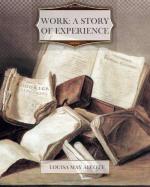“So am I,” answered Christie, with a voice as earnest and a face as full of hopeful resolution as his own.
Then they went back to their work, little dreaming as they tied roses and twined smilax wreaths, how near that other chance was; how soon they were to be called upon to keep their promise, and how well each was to perform the part given them in life and death.
The gun fired one April morning at Fort Sumter told many men like David what their work was to be, and showed many women like Christie a new right to claim and bravely prove their fitness to possess.
No need to repeat the story of the war begun that day; it has been so often told that it will only be touched upon here as one of the experiences of Christie’s life, an experience which did for her what it did for all who took a share in it, and loyally acted their part.
The North woke up from its prosperous lethargy, and began to stir with the ominous hum of bees when rude hands shake the hive. Rich and poor were proud to prove that they loved their liberty better than their money or their lives, and the descendants of the brave old Puritans were worthy of their race. Many said: “It will soon be over;” but the wise men, who had warned in vain, shook their heads, as that first disastrous summer showed that the time for compromise was past, and the stern reckoning day of eternal justice was at hand.
To no home in the land did the great trouble bring a more sudden change than the little cottage in the lane. All its happy peace was broken; excitement and anxiety, grief and indignation, banished the sweet home joys and darkened the future that had seemed so clear. David was sober enough now, and went about his work with a grim set to his lips, and a spark in his eyes that made the three women look at one another pale with unspoken apprehension. As they sat together, picking lint or rolling bandages while David read aloud some dismal tale of a lost battle that chilled their blood and made their hearts ache with pity, each woman, listening to the voice that stirred her like martial music, said within herself: “Sooner or later he will go, and I have no right to keep him.” Each tried to be ready to make her sacrifice bravely when the time came, and each prayed that it might not be required of her.
David said little, but they knew by the way he neglected his garden and worked for the soldiers, that his heart was in the war. Day after day he left Christie and his sister to fill the orders that came so often now for flowers to lay on the grave of some dear, dead boy brought home to his mother in a shroud. Day after day he hurried away to help Mr. Power in the sanitary work that soon claimed all hearts and hands; and, day after day, he came home with what Christie called the “heroic look” more plainly written on his face. All that first summer, so short and strange; all that first winter, so long and hard to those who went and those who stayed, David worked and waited, and the women waxed strong in the new atmosphere of self-sacrifice which pervaded the air, bringing out the sturdy virtues of the North.




